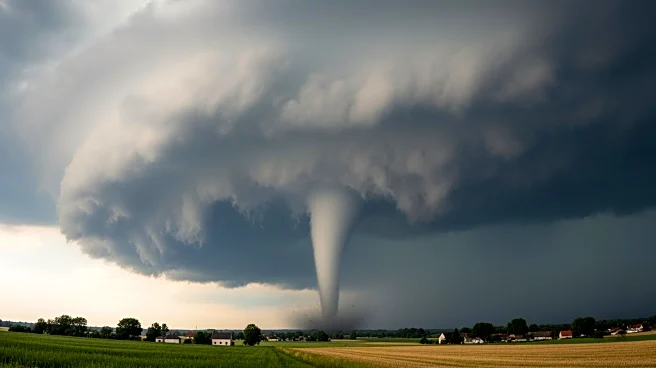What's Happening?
A powerful tornado has struck the southern Brazilian state of Paraná, resulting in the deaths of six individuals and injuring at least 750 people. The tornado, described by Governor Ratinho Júnior as an 'unprecedented
catastrophe,' hit the town of Rio Bonito do Iguaçu with winds potentially exceeding 250 km/h (155 mph). The storm has caused significant damage, affecting approximately 90% of the area's residences and commercial buildings. Aerial footage reveals widespread destruction, with many buildings reduced to rubble. The deceased include three men aged 49, 57, and 83, and two women aged 47 and 14, in Rio Bonito do Iguaçu, along with a 53-year-old man in Guarapuava. One person remains missing, and the number of casualties may rise as rescue operations continue. A state of 'public calamity' has been declared, enabling emergency measures and federal support.
Why It's Important?
The tornado's impact on Paraná highlights the vulnerability of regions to extreme weather events, which can lead to significant human and economic losses. The declaration of a state of public calamity allows for rapid mobilization of resources and federal assistance, crucial for recovery efforts. This event underscores the importance of disaster preparedness and resilient infrastructure to mitigate the effects of such natural disasters. The broader implications include potential disruptions to local economies and the need for improved meteorological forecasting and emergency response systems. The situation may prompt discussions on climate change and its role in increasing the frequency and intensity of such events.
What's Next?
Authorities are focused on rescue operations and assessing the full extent of the damage. Efforts are underway to provide shelter and aid to those displaced by the tornado. The government is likely to seek additional federal support to assist in recovery and rebuilding efforts. Meteorological services are monitoring the cyclone's movement, which is expected to affect other regions, including Rio Grande do Sul, Santa Catarina, São Paulo, and coastal areas of Rio de Janeiro and Espírito Santo. Public safety advisories are in place, urging residents to avoid open areas and be cautious of unstable structures.
Beyond the Headlines
The tornado in Paraná may lead to increased scrutiny of Brazil's disaster management policies and infrastructure resilience. It could also spark discussions on climate adaptation strategies and the need for international cooperation in addressing climate-related challenges. The event may influence public opinion and policy decisions regarding environmental protection and sustainable development.









